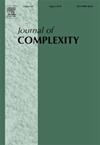对偶扰动下对抗性二部排序的概化界
IF 1.8
2区 数学
Q1 MATHEMATICS
引用次数: 0
摘要
研究对抗性学习的泛化和鲁棒性是一个活跃的研究课题,因为它对设计广泛的机器学习任务的鲁棒模型具有重要意义。本文从学习理论的角度出发,研究了对偶摄动攻击的二部排序的对抗性鲁棒泛化。我们建立了线性假设和多层神经网络的高概率泛化误差界,用于对抗性攻击下的二部排序,通过在iid样本块和覆盖数上发展Rademacher复杂度。我们的研究结果提供了泛化误差与扰动相关因素之间相互作用的理论表征,揭示了特征维数和权值正则化对实现良好泛化性能的重要影响。在实际数据集上的实验结果验证了我们理论发现的有效性。本文章由计算机程序翻译,如有差异,请以英文原文为准。
Generalization bounds of adversarial bipartite ranking with pairwise perturbation
Investigating the generalization and robustness of adversarial learning is an active research topic due to its implications in designing robust models for a wide range of machine learning tasks. In this paper, we aim to investigate the adversarially robust generalization of bipartite ranking against pairwise perturbation attacks from the lens of learning theory. We establish high-probability generalization error bounds of linear hypotheses and multi-layer neural networks for bipartite ranking under adversarial attacks, by developing Rademacher complexity over i.i.d. sample blocks and covering numbers. Our results provide a theoretical characterization of the interplay between generalization error and perturbation-related factors, revealing the important impact of feature dimension and weight regularization for achieving good generalization performance. Experimental results on real-world datasets validate the effectiveness of our theoretical findings.
求助全文
通过发布文献求助,成功后即可免费获取论文全文。
去求助
来源期刊

Journal of Complexity
工程技术-计算机:理论方法
CiteScore
3.10
自引率
17.60%
发文量
57
审稿时长
>12 weeks
期刊介绍:
The multidisciplinary Journal of Complexity publishes original research papers that contain substantial mathematical results on complexity as broadly conceived. Outstanding review papers will also be published. In the area of computational complexity, the focus is on complexity over the reals, with the emphasis on lower bounds and optimal algorithms. The Journal of Complexity also publishes articles that provide major new algorithms or make important progress on upper bounds. Other models of computation, such as the Turing machine model, are also of interest. Computational complexity results in a wide variety of areas are solicited.
Areas Include:
• Approximation theory
• Biomedical computing
• Compressed computing and sensing
• Computational finance
• Computational number theory
• Computational stochastics
• Control theory
• Cryptography
• Design of experiments
• Differential equations
• Discrete problems
• Distributed and parallel computation
• High and infinite-dimensional problems
• Information-based complexity
• Inverse and ill-posed problems
• Machine learning
• Markov chain Monte Carlo
• Monte Carlo and quasi-Monte Carlo
• Multivariate integration and approximation
• Noisy data
• Nonlinear and algebraic equations
• Numerical analysis
• Operator equations
• Optimization
• Quantum computing
• Scientific computation
• Tractability of multivariate problems
• Vision and image understanding.
 求助内容:
求助内容: 应助结果提醒方式:
应助结果提醒方式:


